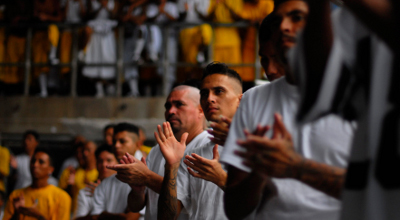Report: Prisons Bustling With Religious Activity
From the perspective of the nation’s professional prison chaplains, America’s state penitentiaries are a bustle of religious activity. According to “Religion in Prisons: A 50-State Survey of Prison Chaplains,” a survey conducted by the Pew Research Center’s Forum on Religion & Public Life, 73 percent of chaplains say that efforts by inmates to proselytize or convert other inmates are either very common or somewhat common.
About three-quarters of the chaplains say that a lot (26 percent) or some (51 percent) religious switching occurs among inmates in the prisons where they work. Many chaplains report growth from religious switching in the numbers of Muslims and Protestant Christians, in particular.
Overwhelmingly, state prison chaplains consider religious counseling and other religion-based programming an important aspect of rehabilitating prisoners. Seventy-three percent of chaplains, for example, say they consider access to religion-related programs in prison to be “absolutely critical” to successful rehabilitation of inmates. Among chaplains working in prisons that have religion-related rehabilitation or re-entry programs, 57 percent say the quality of such programs has improved over the last three years and 61 percent say participation in such programs has gone up.
At the same time, a sizable minority of chaplains say that religious extremism is either very common (12 percent) or somewhat common (29 percent) among inmates. Religious extremism is reported by the chaplains as especially common among Muslim inmates–including followers of the Nation of Islam and the Moorish Science Temple of America–and, to a substantial but lesser degree, among followers of pagan or earth-based religions such as Odinism and other small religious groups that many Americans may never have heard of.
An overwhelming majority of chaplains, however, report that religious extremism seldom poses a threat to the security of the facility in which they work, with only 4 percent of chaplains saying religious extremism among inmates “almost always” poses a threat to prison security and an additional 19 percent saying it “sometimes” poses a threat.















































